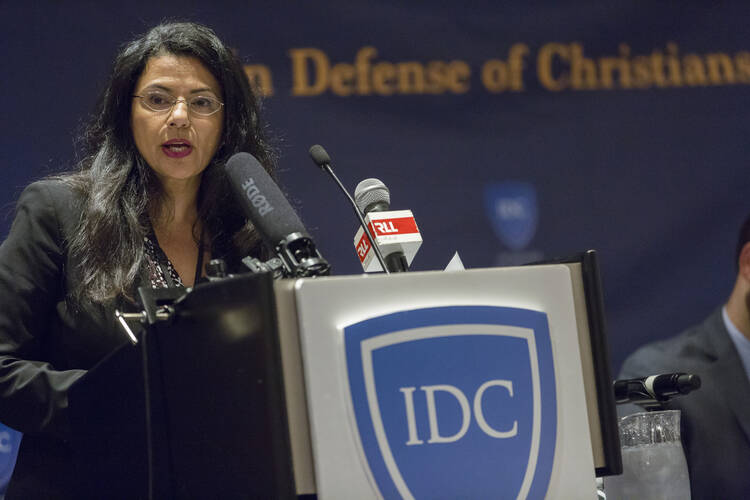WASHINGTON (CNS) -- Policy experts say it is in the best interest of the United States to protect religious minorities, including Christians, in the Middle East.
At a panel at the 2017 In Defense of Christians Summit Oct. 25, Robert Nicholson, executive director of the Philos Project, said often when he is discussing the need to protect Christians in the Middle East, people will tell him that they care about Christians, but they don't know what the United States can do about it, since another invasion of Iraq is unlikely.
"Americans do care in principle about Christians, because most Americans are Christian," said Nicholson. He also noted that the Declaration of Independence and the Constitution say that "human beings matter."
Part of the problem is that the United States lacks an overarching idea or policy to handle the situation.
Nicholson said he thinks part of the problem is that the United States lacks an overarching idea or policy to handle the situation, which leaves people at a loss of what to do. He suggests that the U.S. government should create a task force to reframe the protection of Christians in the Middle East under the mission of building, maintaining and strengthening pluralistic societies.
"The Middle East has historically been a mosaic, and it's been its best when it has been very diverse and pluralistic," he explained.
Pluralistic societies that contain Christians tend to be more moderate, Nicholson noted. Christians in those societies make a "very tangible contribution," being some of the most educated and wealthy people, he added.
"The Middle East without Christians is not going to be a safer, freer region," said Nicholson, whose Philos Project is one of the sponsors of the three-day summit, whose theme was "American Leadership and Securing the Future of Christians in the Middle East." The summit gathered policy advocates and politicians, as well as speakers and church leaders from the Middle East.
Nermien Riad, executive director of Coptic Orphans, spoke about the attacks against Christians in Egypt since the 1970s. Since 2012, she said, there have been 546 sectarian attacks on the homes, businesses and churches of Coptic Christians.
"The Middle East without Christians is not going to be a safer, freer region."
"If ever there was a time to collectively support the largest remaining Christian population in the Middle East, it is now," she said.
In addition to persecution, Coptic Christians are being discriminated against in other ways, such as omitting them from the most recent census and from history lessons in schools, Riad said, adding that they also face restrictions upon how they can build and maintain their churches.
These conditions, along with the brutal killings of Christians, have led to the mass migration of Coptic Christians out of Egypt, with about 20 percent of them now living outside of the country. Riad cited the October killing of a priest who had his throat slit and a cross carved into his forehead as he was walking down the street.
Such large numbers of Coptic Orthodox Christians have migrated to the United States that Riad said people have started to joke that Pope Tawadros II, whom they refer to as the "pope and patriarch of Alexandria," will start being called the "pope and patriarch of Alexandria, Virginia."
"While benefits of immigration are good for those who immigrate, it is really detrimental for those in the homeland," said Riad, noting that the country loses the talents of those who leave. "We mourn for our homeland, Egypt, who robbed herself of the benefits of her own people."
"While benefits of immigration are good for those who immigrate, it is really detrimental for those in the homeland."
Iraq has gone through a similar problem of Christians leaving the country, which Loay Mikhael warned is the beginning of the religion's extinction in the country. Before 2003, the country had more than 1 million Christians living there, and now only has about 200,000, said Mikhael, who heads the foreign relations committee of the Chaldean Syriac Assyrian Popular Council. He called for increased U.S. protection of Christians in Iraq.
Stephen Hollingshead, managing director of the Safe Haven Project, said the main work he does in northern Iraq involves the creation of "safe economic zones," where "security fosters productivity." The Safe Haven Project, launched by In Defense of Christians, aims to help persecuted Christian communities in the Middle East recover self-sufficiency by encouraging economic opportunity in the Ninevah Plain.
"You can't have an economy if you don't have security," said Hollingshead. "People work because they have a reasonable expectation that they will reap the rewards of their labor."
"You can't have an economy if you don't have security."
Andrew Walther, vice president of communications and strategic planning for the Knights of Columbus, noted that what began as the Islamic State group attacking minorities in areas under its own control escalated to attacks elsewhere and turned into a global threat. This means it is in the United States' interest to stabilize the Middle East, he said.
But aside from national interest, "these Christian minorities deserve support on a fundamental level," said Walther.
Noting how the Bill of Rights includes freedom of religion, Walther said, "This has not only legal implications within our own borders, it has moral implications beyond them.""When America speaks with moral clarity on religious freedom and takes humanitarian action, it is good for the world and good for America's standing in the world," he said.
- - -
Coverage of international religious freedom issues by Catholic News Service is supported in part by Aid to the Church in Need -- USA (www.acnusa.org).










